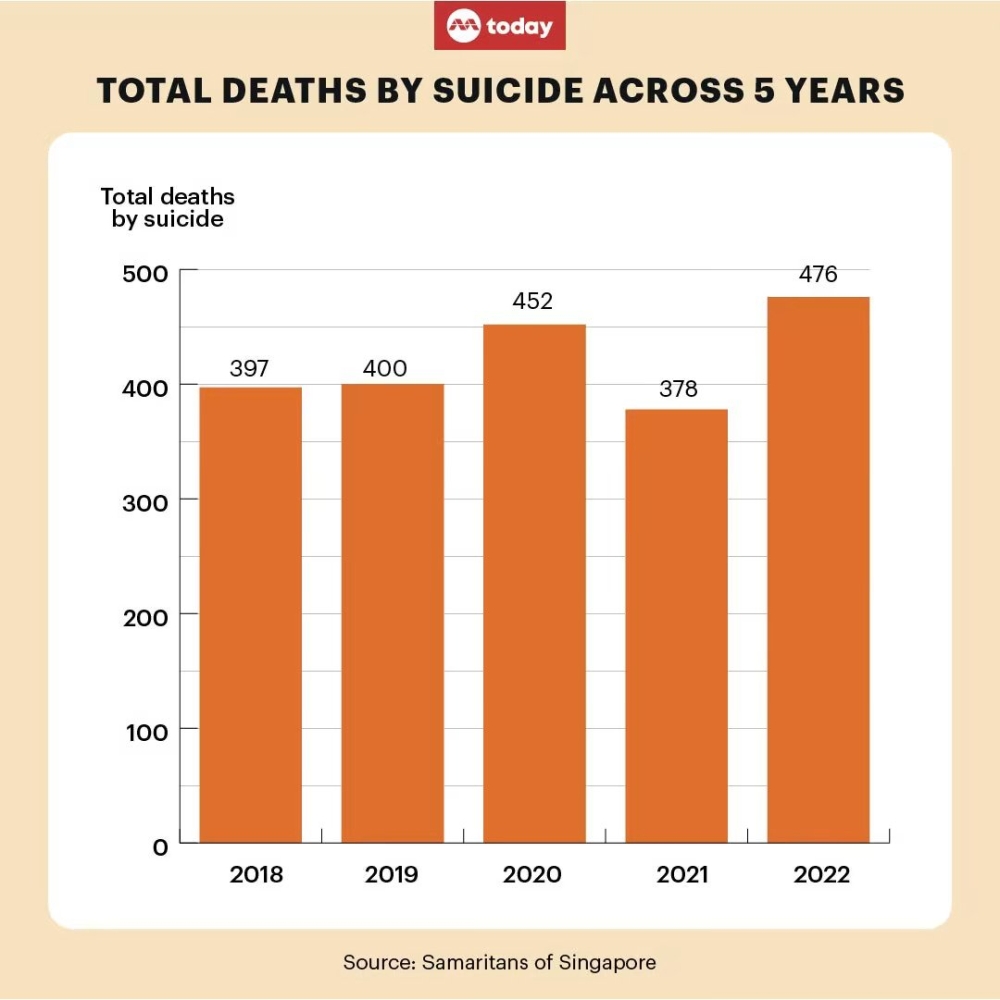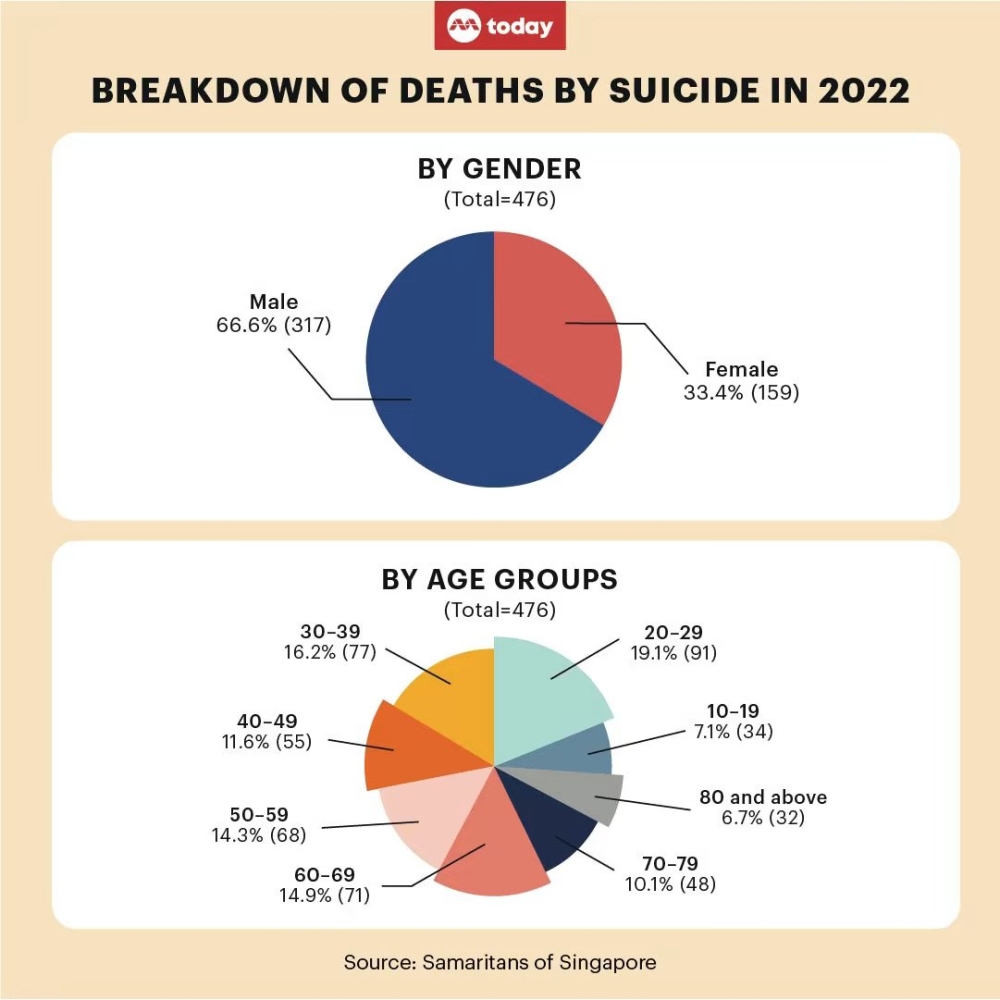SINGAPORE, July 1 — In the latest set of data released, Singapore saw its highest number of suicide rates since 2000, and the greatest number of deaths was among young people aged 20 to 29.
The Samaritans of Singapore (SOS) said a press statement yesterday that a total of 476 suicides were reported last year, with 91 being people in their 20s.
In 2000, when the non-profit organisation first recorded suicide data, there were 348 suicide cases.
Overall, the latest figures also showed a concerning 25.9 per cent rise from 2021 when there were 378 cases, SOS said.
Last year, suicide rates went up for most age groups, but particularly among the young and seniors. And males outnumbered females among the casualties, as was the case in past years.
People aged 70 to 79 registered the highest increase of 60 per cent in suicide deaths compared to last year, a rise from 30 to 48, SOS said.
For those aged 10 to 29, suicide remains the leading cause of death for the fourth consecutive year, constituting 33.6 per cent of all deaths within this group.
At the same time, suicide deaths for this group rose from 112 in 2021 to 125 in 2022.
On what were the likely causes for the rise in suicides, SOS told TODAY that suicide is complex and influenced by a variety of factors so it cannot comment for sure.
“But according to what we’ve observed from our services (such as the hotline and text chat), the top three most frequently presented problems were family problems, employment and financial difficulties, as well as romantic relationships.”

Dr Jared Ng, a senior consultant and medical director at Connections MindHealth, a standalone psychiatric practice under the Fullerton Health Group, said in the press statement: “Seeing the unprecedented rise in suicide numbers in Singapore is profoundly heartbreaking.
“This increase paints a picture of the unseen mental distress permeating society, especially among our youths and the elderly.
“It is crucial that we remain vigilant to the pressing issues that continue to heavily affect mental health, such as social isolation and loneliness.
“The time is now, to double our efforts in the realm of early detection and to actively encourage a culture of seeking help and watching out for one another.”
SOS said that it observed a 27 per cent increase last year for the use of its services — comprising its 24-hour hotline and text messaging service CareText — as compared to 2021.
Gasper Tan, chief executive officer of SOS, said: “While suicide is a complex issue influenced by various factors, including mental health challenges, social pressures and economic uncertainties, our collective efforts to address these underlying causes must take priority.
“We recognise the urgency of the situation and are committed to continue taking proactive steps to address the rising suicide numbers and provide support to those in need.”

SOS told TODAY that everyone needs to “continue to turn conversations into actions”.
“Suicide prevention is a complex issue that requires a multi-faceted approach involving various stakeholders, including you and I.
“We must continue educating communities about resources, improve access to mental health support and equip first responders with the knowledge and skills to identify individuals at risk and connect them with appropriate support.”
The organisation has introduced several programmes over the years, it added, including one called Light in the Dark, a support group for people who have attempted suicide, and Be a Samaritan, a first-responder community programme.
It also collaborates with community partners to widen the safety net and raise awareness aimed at reducing stigma and encouraging help-seeking.
Dr Ong Say How from the Institute of Mental Health outlined the importance of forming a safety net to prevent such tragedies.
The senior consultant and chief of the hospital’s department of developmental psychiatry said: “From efforts to improving mental health literacy such as knowing the warning signs of distress and importance of self-care to teaching peer-support skills, we must leave no stone unturned.
“Beyond the knowledge, we should also guide the youth on when and where to seek help.”
Tan of SOS said: “Suicide is preventable. With the mission to be an available lifeline to anyone in crisis, SOS is dedicated to building an ecosystem of care where every individual feels valued, supported and empowered to seek help when needed.”
Where you may seek help in Singapore
Samaritans of Singapore: 1-767 (24-hour hotline) or 9151 1767 (24-hour CareText via WhatsApp)
Singapore Association of Mental Health: 1800 283 7019
Emergency helpline of the Institute of Mental Health: 6389 2222 (24-hour hotline) — TODAY
* If you are lonely, distressed, or having negative thoughts, Befrienders offers free and confidential support 24 hours a day. A full list of Befrienders contact numbers and state operating hours is available here: www.befrienders.org.my/centre-in-malaysia. There are also free hotlines for young people. Talian Kasih at 15999 (24/7); and Talian BuddyBear at 1800-18-2327(BEAR)(daily 12pm-12am).






















